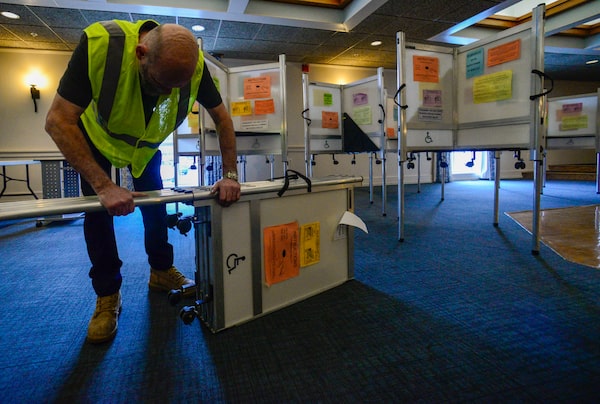
A maintenance worker for the Brattleboro, Vt., Department of Public Works helps assemble the voting booths as people turn a section of the American Legion lodge into the town's polling location on March 4, before Tuesday's election.Kristopher Radder/The Brattleboro Reformer via AP
Deep in the southeast of Vermont, the town of Brattleboro is among the more elderly places in the U.S. It’s situated in a state that is one of the greyest in the country, and a county where more than a quarter of the population is over 65.
On Tuesday, however, Brattleboro will open some of its ballots to some of the youngest voters in the country. Teens aged 16 and 17 will, for the first time, be allowed to participate in the election of local political leaders.
“To get people involved, you give them political rights,” said Kurt Daims, director of Brattleboro Common Sense, a left-leaning activist group.
Across the U.S., 15 states and one territory will hold votes on Super Tuesday, which could bring the Republican presidential nomination nearly within the grasp of Donald Trump. His influence on U.S. politics has coincided with what researchers around the world have called an erosion in the country’s democratic institutions.
But in Vermont, Super Tuesday will also mark new efforts to open wider the door to local democratic participation, to include not only teenagers but non-citizens. It’s a reminder that “democracy has a lot of defenders – and is important to an awful lot of people here,” said Eugene Bergman, a city councillor who chaired the Charter Change committee in Burlington.
The city – the largest in Vermont – last year opened local elections to residents who are not U.S. citizens. It followed the lead of two other cities in the state: Winooski and Montpelier, the capital, which in the past few years have fought off legal challenges from the Republican National Committee and vetoes by the state’s Republican governor to allow non-citizens to vote.
“This is an attempt, to the extent legally possible, to have government of the people by the people and for the people,” Mr. Bergman said. “Because no matter if you are a citizen or not, when you walk on broken sidewalks or you try to ride your bicycle on broken streets, or your kids ride on those sidewalks, you are affected.”
Evangelical Christians flocking to Trump in greater numbers than ever
In Brattleboro, meanwhile, the bid to open the ballot to younger teens began more than a decade ago, led by Mr. Daims and his daughters. It started with an attempt to open avenues for greater high school student participation in school boards – an effort that has not succeeded. Instead, those 16 and 17 years of age were given the right to vote on local matters.
Critics saw a lower voting age as a Trojan horse for collecting more liberal votes. Mr. Daims pointed to more important objectives.
“Democracy really will flourish if there is variety, if there is active discussion – if there is new people,” he said. “That’s how you make your democracy strong and safe.”
Vermont does not number among the most diverse regions in the U.S. Its population of 642,000 – second smallest among states – is almost 94-per-cent white. Only 5.3 per cent of the people in Burlington are not U.S. citizens. Many voters lean to the far left; U.S. Senator Bernie Sanders was once the mayor of the city.
Across the U.S., fewer than two dozen cities have measures to include non-citizens, but Vermont is adding momentum to a trend that has already brought such voting to San Francisco and New York. (Non-citizens can only vote on local matters; state and federal ballots remain open only to those with citizenship.)
The efforts to open ballots to new people is set against what Mr. Daims calls “a general soul searching about civil rights and voting” in the U.S. – a broader democratic contemplation set against the painful political rifts in a polarized country. It’s not clear, either, how many high school students will take the opportunity. Brattleboro Common Sense did not have time to promote the youth vote, Mr. Daims says.
But for Vermont, a state that has among the greyest demographics in the U.S., Mr. Daims sees another reason to have young people vote while they are still living at home. Perhaps, he says, it can help to build the kind of connection that keeps people from leaving.
“People tend to stay and live where they first vote,” he said. “It’s very compelling for them to feel attached.”